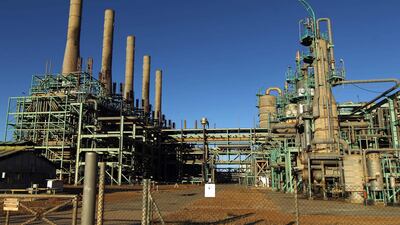Libyan National Army forces launched a counter-attack on Saturday to regain key oil ports seized by militias as the country’s civil war escalates.
Militias, including the Benghazi Defence Brigades, originally from the city of the same name, captured Es Sider and nearby Ras Lanuf refinery on Thursday in fighting that set a giant storage tank ablaze.
The attack apparently caught the LNA, commanded by Field Marshal Khalifa Haftar, off guard, with the bulk of its troops deployed further east battling militias for control of the coastal town of Derna. The Derna battle has been raging for three weeks, with the LNA claiming to have captured most of the town, the last eastern Libyan settlement held by militia forces.
In response to the oil ports attack, Field Marshal Haftar's forces launched air strikes on Friday, with social media reporting an LNA armoured infantry battalion deploying for a counter-attack.
The battle is a re-run of fighting in March last year when the BDB captured the two ports for 10 days before being forced out with heavy casualties by the LNA.
Libya’s two governments condemned the latest attack, with both the House of Representatives parliament in Tobruk and its rival UN-backed Government of National Accord in Tripoli demanding the militias withdraw.
The United Nations Support Mission for Libya, which is negotiating for elections to be held in December to end the civil war, issued its own condemnation, tweeting: “This dangerous escalation in the Oil Crescent area puts Libya’s economy in jeopardy and risks igniting a widespread confrontation.”
The state-owned National Oil Corporation has evacuated employees from the area, which lies on the central coast, with tanker loadings suspended. The two ports handle exports from the so-called Oil Crescent, a vast area of production fields that supply more than two thirds of Libya’s oil output and is under the control of the Tobruk parliament.
Fighting at the ports and in Derna are significant obstacles to UN plans to hold elections on December 10, a date set in peace talks hosted by French President Emmanuel Macron in Paris last month. Some diplomats doubt the feasibility of holding a vote when parts of the country are a war zone, and the fighting at the oil ports is a reminder of the bitter divisions that continue to grip Libya.
_______________
Read more:
US acts against Libya-based traffickers sanctioned by UN
Libya: Battle for Derna nears end
Macron delivers pact for national elections in Libya
_______________

